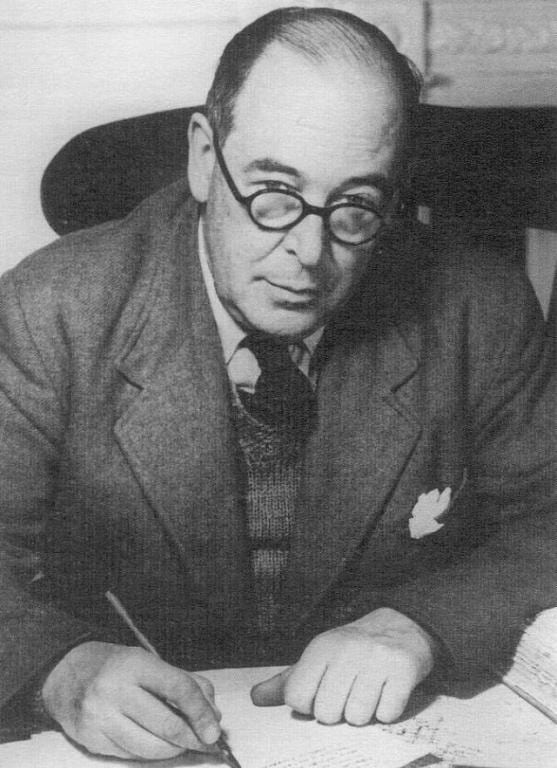
I’ve been reading through the two volumes of Collected Letters of C. S. Lewis (running from 1931-1963) — edited by Walter Hooper –: some 2500 pages worth of endless treasures and insights. One thing I’ve learned about Lewis is that he exhibited very strong signs of exceptional sanctity.
It may not be how we usually think of the apologetics and fantasy writer titan, but it is a delightful thing to behold. I shall examine five different ways that C. S. Lewis showed forth the love of Christ and profound signs of a life of deeply committed discipleship. Here is the bibliographical information:
The Collected Letters of C. S. Lewis, Vol. II: Books, Broadcasts, and the War, 1931-1949, edited by Walter Hooper, HarperSanFrancisco, 2004.
The Collected Letters of C. S. Lewis, Vol. III: Narnia, Cambridge, and Joy 1950-1963, edited by Walter Hooper, HarperSanFrancisco, 2007.
1) Humility I’ll start with Lewis’ self-effacing descriptions of himself and his fame:
I am going to be (if I live long enough) one of those men who was a famous writer in his forties and dies unknown . . . (12-20-51: Vol. 3, 150)
I don’t wonder that you got fogged in Pilgrim’s Regress [published in 1933]. It was my first religious book and I didn’t then know how to make things easy. . . . in those days I never dreamed I would become a ‘popular’ author and hoped for no readers outside a small ‘highbrow’ circle. (1-19-53: Vol. 3, 282-283)
As to the reward for printed work (apart from money) one’s first good reviews are very sweet — perhaps dangerously so — and fame has one really solid good about it in so far as it makes some strangers approach you with a friendliness they would not have felt otherwise. . . . The rest is all in the order of those things which it is painful to miss but not really nice to get. (7-16-53: Vol. 3, 346)
2) Endless Letter-Writing Lewis notes very often in his writing about how many letters he had to answer, and how his writing hand literally ached from rheumatism (which began as early as his 30s): so much so that he also often mentions how his writing is barely legible as a result. His usual habit was to correspond for two to three hours in the morning hours before his work as an Oxford don began.
The letters he received greatly increased as a result of his broadcast talks and his ever-more popular works of lay apologetics and fantasy fiction. Of course this was for no pay, and it was a considerable sacrifice of his time and effort. Why did he do it? Well, he explains why:
You may put out of your head any idea of ‘not having a claim’ on any help I can give. Every human being, still more every Christian, has an absolute claim on me for any service I can render them without neglecting other duties. (4-30-41: Vol. 2, 482)
[A]s the aftermath of those Broadcast Talks I gave early last summer [these later became part of the book Mere Christianity] I had an enormous pile of letters from strangers to answer. . . . many from serious inquirers whom it was a duty to answer fully. So letter writing has loomed pretty large! (12-23-41: Vol. 2, 504)
Can’t write more as I have um-teen letters to get through before I settle down to scholarship papers. (April 1942: Vol. 2, 518)
I’ve been having great luck with my books lately . . . but the catch is it increases the amount of letters one has to write almost beyond endurance. (January 1943: Vol. 2, 549)
3) Charitable Giving Editor and Lewis friend Walter Hooper referred to Lewis’ extraordinary generosity (vol. 2, 483, italics reversed from the original):
Lewis . . . would not accept the money [for the original installments of Screwtape Letters in The Guardian], Instead, he sent the editor of The Guardian a list of widows and orphans to whom the [money] was to be paid. He did the same with the fees the BBC paid for the ‘Mere Christianity’ broadcasts, and those The Guardian paid for the weekly instalments of The Great Divorce in 1944-5. . . . from then until his marriage in 1957 Lewis made anonymous gifts of two-thirds of his income.
4) Mrs. Moore Alice von Hildebrand, in a wonderfully informative article about this aspect of C. S. Lewis’ life, noted:
“Jack,” as Lewis was known to his family, enlisted during the First World War while still a teenager. While undergoing training, he befriended a young man named Paddy Moore, who had a divorced mother and younger sister, Maureen, back at home. The young men promised each other that if one of them were to be killed in combat, the other would look after his friend’s parent. (Jack’s father was a widower.)
Paddy was killed in the war, and Mrs. Janie Moore and her daughter Maureen shortly after started to live with Lewis. Maureen eventually married, but Mrs. Moore — increasingly invalid in her later years –, continued to live with him until shortly before her death in 1951. In his letters he constantly referred to her as his “mother” (not even using the quotation marks) and made reference to harrowing “domestic” problems that were a constant source of anxiety and misery.
She had been placed in a nursing home for some months before her death, which was another financial burden that Lewis bore; and he visited her for an hour each day there until she died.
Mrs. Moore was (far as I can tell) a lifelong atheist and notoriously cranky in temperament and difficult to get along with. Lewis’ older brother Warnie, who also lived with him most of the time (minus periods of military obligations) was quite disgusted with Mrs. Moore: whom he once referred to as “that horrid woman”. C. S. Lewis was nevertheless charitable in referring to her in his letters. Only after she died did he share some of what he willingly endured, out of obligation to his old war buddy:
I have lived most of it [his private life] . . . in a house which was hardly ever at peace for 24 hours, amidst senseless wranglings, lyings, backbitings, follies, and scares. I never went home without a feeling of terror as to what appalling situation might have developed in my absence. Only now that it is over (tho’ a different trouble has taken its place) [Warnie’s problem drinking] do I begin to realize quite how bad it was. (4-18-51: Vol. 3, 108)
She was an unbeliever and, in later years, very jealous, exacting, and irascible, but always tender to the poor and to animals. (1-10-52: Vol. 3, 158)
5) Oxford, Cambridge, & Lewis’ Domestic Life Lewis had been offered a prestigious professorship at Cambridge University in 1954: a new chair essentially created with him in mind (Professor of Medieval and Renaissance English). This had never happened to him at Oxford, where he was a mere don, whose daily tasks consisted of innumerable tutoring of students, occasional lectures, and hours upon hours of correcting and grading papers.
The Christian Faith, as I think, counts for more among Cambridge men than among us; Communists are rarer and those plaguey philosophers whom we call Logical Positivists are not so powerful. (12-5-54: Vol. 3, 540)*[Cambridge is] Much more old-fashioned and less hard-boiled . . . (12-10-54: Vol. 3, 541)
I’m sorry about your two jealous colleagues. I suppose the only way with thorns in the flesh (until one can get them out) is not to press on the place where they are embedded: i.e. to stop one’s thoughts ( . . . read St. Francois de Sales’ chapter on Meekness towards oneself) whenever one finds them moving towards unpleasant people. (6-21-55: Vol. 3, 622)
Domestic necessities govern all our lives at present, and by moving I should lose an invaluable servant [Fred Paxford, his gardener and handyman]. (5-12-54: Vol. 3, 470)
The more I look at it the less possible it seems to transport the peculiar domestic set-up of my brother, our man, and myself. There is a whole network of conveniences and life-lines slowly built up here (my brother, in your ear, is not always in perfect psychological health) which I really dare not abandon. (5-15-54: Vol. 3, 474)
It was as I thought: the chief obstacle is domestic. He has a house and some dependants — including his brother. He will not contemplate closing that establishment. (5-18-54: Vol. 3, 475)
As long as my normal housekeeping can be at Oxford, and that the life-lines I told you of are intact, and it is a question of rooms in Cambridge . . . I could manage well. I can both work and sleep in trains . . . (5-19-54: Vol. 3, 476)
*
My book royalties from three bestsellers in the field (published in 2003-2007) have been decreasing, as has my overall income, making it increasingly difficult to make ends meet. I provide over 2500 free articles here, for the purpose of your edification and education, and have written 50 books. It’ll literally be a struggle to survive financially until Dec. 2020, when both my wife and I will start receiving Social Security. If you cannot contribute, I ask for your prayers. Thanks! See my information on how to donate (including 100% tax-deductible donations). It’s very simple to contribute to my apostolate via PayPal, if a tax deduction is not needed (my “business name” there is called “Catholic Used Book Service,” from my old bookselling days 17 or so years ago, but send to my email: [email protected]). May God abundantly bless you.
***













